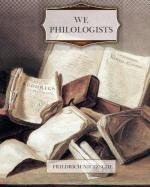Thus the inner purpose of philological teaching has been entirely altered; it was at one time material teaching, a teaching that taught how to live, but now it is merely formal.[2]
32
If it were the task of the philologist to impart formal education, it would be necessary for him to teach walking, dancing, speaking, singing, acting, or arguing . and the so-called formal teachers did impart their instruction this way in the second and third centuries. But only the training of a scientific man is taken into account, which results in “formal” thinking and writing, and hardly any speaking at all.
33
If the gymnasium is to train young men for science, people now say there can be no more preliminary preparation for any particular science, so comprehensive have all the sciences become. As a consequence teachers have to train their students generally, that is to say for all the sciences—for scientificality in other words; and for that classical studies are necessary! What a wonderful jump! a most despairing justification! Whatever is, is right,[3] even when it is clearly seen that the “right” on which it has been based has turned to wrong.
34
It is accomplishments which are expected from us after a study of the ancients: formerly, for example, the ability to write and speak. But what is expected now! Thinking and deduction . but these things are not learnt from the ancients, but at best through the ancients, by means of science. Moreover, all historical deduction is very limited and unsafe, natural science should be preferred.
35
It is the same with the simplicity of antiquity as it is with the simplicity of style: it is the highest thing which we recognise and must imitate; but it is also the last. Let it be remembered that the classic prose of the Greeks is also a late result.
36
What a mockery of the study of the “humanities” lies in the fact that they were also called “belles lettres” (bellas litteras)!
37
Wolf’s[4] reasons why the Egyptians, Hebrews, Persians, and other Oriental nations were not to be set on the same plane with the Greeks and Romans: “The former have either not raised themselves, or have raised themselves only to a slight extent, above that type of culture which should be called a mere civilisation and bourgeois acquirement, as opposed to the higher and true culture of the mind.” He then explains that this culture is spiritual and literary: “In a well-organised nation this may be begun earlier than order and peacefulness in the outward life of the people (enlightenment).”
He then contrasts the inhabitants of easternmost Asia ("like such individuals, who are not wanting in clean, decent, and comfortable dwellings, clothing, and surroundings; but who never feel the necessity for a higher enlightenment”) with the Greeks ("in the case of the Greeks, even among the most educated inhabitants of Attica, the contrary often happens to an astonishing degree; and the people neglect as insignificant factors that which we, thanks to our love of order, are in the habit of looking upon as the foundations of mental culture itself").




